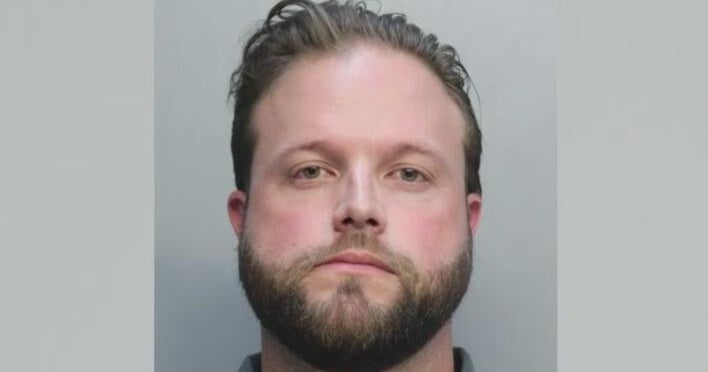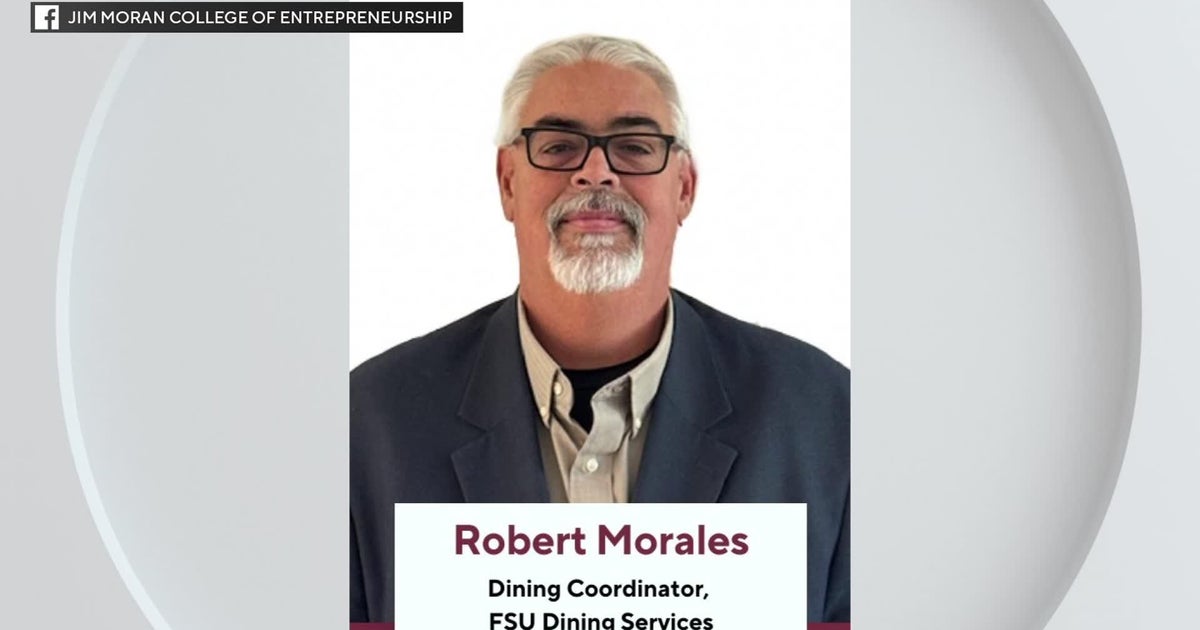Trump’s visit to Miami landmark left some Cuban Americans feeling betrayed
“I felt my stomach turn,” said Fernandez, a 51-year-old copywriter and editor who grew up in the area. “I thought I was going to be sick.”
Supporters had crammed the porch, chanting “Trump 2024” by the walk-up coffee window where she ordered pastelitos de guayaba. Cameras trailed the former president onto the green-and-white checkered floor inside, recording pastors and a rabbi — among other special guests searched by Secret Service agents — who prayed over him in Spanish.
“I don’t know if I’ll ever be able to go back there again,” Fernandez said. “Trump is not just a regular politician, in my opinion. He’s a criminal.”
The scene at the Little Havana landmark where presidential hopefuls are known to shake hands provoked intense reactions from Cuban Americans tracking the spectacle from around the block to thousands of miles away. Some praised Versailles for hosting a politician they saw as “anti-communist” and wrongly accused. Others pledged to boycott the gathering space they’d long cherished, condemning the enthusiastic reception of someone accused of undermining national security.
Over the past five decades, Versailles has hosted candidates across the ideological spectrum. But for some in today’s hyper-charged political environment, opening the door for what amounted to an unofficial Trump rally after two indictments crossed a line.
“It’s not as if he was charged with breaking a dish in the White House,” said Marisel Morales, 66, a former senior official appointed by both Bush administrations. “He was charged with putting the national security of the United States in danger.”
Seeing him celebrated at Versailles, she said, “is an insult to the country that took us in.”
As Florida has veered right, Trump has maintained a grip on greater Miami, where MAGA gear is commonly spotted. A recent Florida International University poll of Cuban Americans who vote Republican in South Florida found that nearly 60 percent wanted to see him run again for office. Roughly a third of Miami-Dade County residents have Cuban roots.
When something big happens — election results, Heat wins — Versailles has historically served as a hub for togetherness. Thousands streamed to the restaurant to cheer the death of Fidel Castro. And politicians head there to connect with the Cuban American community. Past diners include George W. Bush, Bill Clinton and John McCain. Trump dropped by in 2016.
“Our founder, my father-in-law, was adamant: No matter what their political views are, whoever wants to come, they’ve always been welcome to come,” said Rick Estrada, who is married to one of the owners, Jeannette Valls Edwards. “It’s a meeting house for open ideas, and the First Amendment is something we hold dear.”
Dozens of Trump’s admirers, wearing MAGA hats and waving American flags, flocked to the restaurant as a motorcade shuttled him from the courthouse five miles away. Some followed minute-by-minute developments on their cellphones.
When he finally made his way to Versailles, the crowd was ready. Some chanted “USA!” and “Donald Trump!” Others sang “Happy Birthday,” in honor of him turning 77 on Wednesday. Carines Moncada, an opinion host for Americano Media, a Spanish-language conservative radio and streaming news service, joined dozens in praying next to Trump on the bakery floor.
She’d interviewed him the day before, she said, and worried about what the indictment meant for the country. So, Moncada, a Venezuelan American, had summoned religious leaders to Versailles to pray for him, choosing the restaurant because it’s a “landmark” for Hispanics.
“Why would you criticize a prayer event?” Moncada asked. “People wanted to pray for him.”
Among the fans was Anthony DeCubas, a 24-year-old boxing trainer who’d gotten the tip that Trump would appear from a Cuban exile news channel his grandmother watches. His love for Trump didn’t spring from any one policy or position, he said. It was more of a gut feeling.
“He’s got this spark,” DeCubas said.
Life seemed more chaotic since Trump left office, he added: the war in Ukraine, the rising cost of everyday goods …
“I felt like Trump was keeping world peace,” he said.
On his arm was his grandmother, 80-year-old Yolanda Morejon, fanning herself in the 90-degree heat. She thought President Biden was too soft on Cuba’s one-party government. She called Trump “anti-communist” and worried that authorities were unfairly targeting him.
Many in the crowd, including Morejon, had fled Cuba in the 1960s or descended from someone who had as Castro’s henchmen executed opponents and confiscated property. To her, Trump’s indictment bore traces of authoritarian crackdowns on dissent in some Latin American nations. Outside the courthouse, one of his lawyers described the case as “the type of thing you see in dictatorships like Cuba and Venezuela.”
“I don’t want to see that happen here,” Morejon said.
Trump’s popularity among Cuban Americans isn’t driven only by beliefs that he’s the victim of some left-wing witch hunt, said Michael Bustamante, a historian at the University of Miami focused on the community. Nor is it just the product of Republicans accusing Democrats of pushing socialism, which is particularly effective, he said, at triggering fear in these households.
“It’s this vision of America he’s selling,” said Bustamente, whose father is Cuban. “What Trump sells is this uber-capitalism, the complete and utter opposite of everything they perceive they left behind.”
He was dismayed to see footage of a Sky News reporter getting kicked out of the Versailles bakery after shouting at Trump, “Are you ready to go to jail?”
The crowd booed. People yelled, “Get her out of here” and “out, out, out!” Michael Caputo, an ex-Trump official who’d helped organize the Versailles visit, leaned close to her and yelled, “You stupid b—–.” (His reaction was “unartfully expressed,” Caputo told The Washington Post. The Sky News reporter declined to comment.)
“Hardly the embodiment of tolerating dissent,” Bustamente said.
Fernandez, the copywriter and editor, saw the clip, too. How many times had she walked across that same green-and-black checkered floor? A thousand? More? She’d never seen anyone so angry in there.
As a Democrat, she said, Republicans visiting Versailles in the past hadn’t bothered her. But pulling up fresh from an arraignment was no typical campaign stop. She teared up thinking about how much she’d miss the place.
“The Cuban atmosphere, the delicious food — when you go, you feel like you’re with extended family,” she said.
Her father, who died a year-and-a-half ago, had been friends with the founder, Felipe Valls Sr., a Cuban businessman who’d started over in South Florida after Castro’s regime seized his enterprises back home. Some of her happiest memories involve those guava pastries.
She’d read that Trump hadn’t taken a bite of anything. The Miami New-Times reported that he’d said “food for everyone!” and then neglected to pick up the bill. (“Don’t know anything about that,” said Estrada, the co-owner’s husband.) Meanwhile, someone had offered him a cafecito, a Cuban coffee, and he declined.
Versailles’s owners didn’t respond to requests for comment.
“It was all for show,” Fernandez said, “and it was a betrayal. He claims to be anti-communist but in every other way, he’s a wannabe dictator.”
Carolina Camps, president of Cuban American Women Supporting Democracy, a nonpartisan advocacy group, would have rather seen a town hall. A debate. Not people chanting “Trump 2024” and “f— Joe Biden.”
“Not this fanaticism,” said the retired pharmaceutical executive, 77. “They look like they’re possessed.”
Politicians should be scrutinized — not worshiped, she said.
“We’ve seen these ‘rallies’ before,” she said. “Fidel did it.”
Giancarlo Sopo, 40, rejected the comparisons to the types of political prosecutions seen in authoritarian Latin American countries. The Republican media strategist from Miami, who led Hispanic advertising for Trump in 2020, followed the scene at home on television.
“Comparing it to the regime’s persecution of dissidents is a slap in the face to every single Cuban American, especially those of us whose families have literally shed blood in this 64-year tragedy,” said Sopo, whose grandfather died in state custody. (Nowadays, he said, he backed Florida Gov. Ron DeSantis.)
When Morales, the former Bush administrations appointee, visited Miami from Washington, she liked to fill her suitcase with Cuban snacks from Versailles and other eateries.
Dining at the restaurant was a family tradition, she said. Her father, a Cuban journalist, had lost his job for speaking out against Castro. As a kid, she’d helped him sell poundcakes in Havana to get by. Then the family landed in South Florida.
She’d voted Republican most of her life, weary of too much government control. In recent years, Morales identified as an Independent. She’d never been fond of Trump, but now, she wanted the justice system to hold him accountable.
So she made her stance clear on Twitter: She’d never again dine at Versailles.



